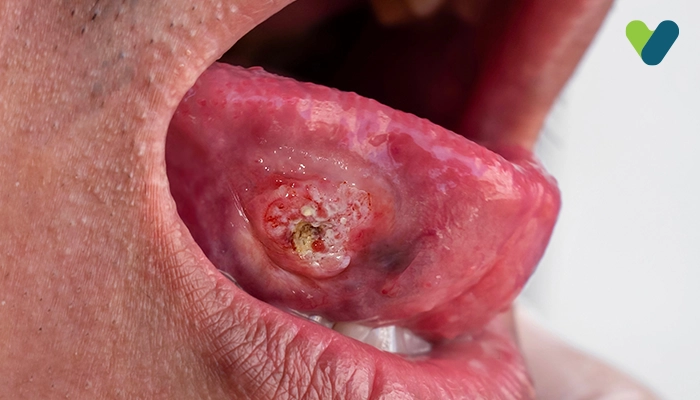Ramanujam is a 47-year-old man living in Hyderabad. Over the past few days, he has been experiencing difficulty swallowing food. His mouth and tongue are also full of ulcers. He got himself checked with a doctor. After a few tests, the doctor confirmed that these are all symptoms of tongue cancer. The doctor, however, said not to panic much, as his is an early-stage tongue cancer, which is highly curable.

Tongue cancer is often caused due to the growth of thin and flat squamous cells at the lining of the tongue. Early detection is vital to curing tongue cancer. Tongue cancer can occur not just in the throat, but in the mouth as well. Ramanujam was lucky to detect tongue cancer in its early stage. He is now a successful cancer survivor to inspire others.
Let us dig deeper to understand all about the base of tongue cancer symptoms and other signs of tongue cancer.
What Is Tongue Cancer?
Tongue cancer is a type of oral cancer that develops due to the growth of squamous cells on the tongue lining. The most common symptom of tongue cancer is when your tongue pains and takes time to heal. Tongue cancer usually develops on the front side of the tongue. Cancer that develops at the backside of the tongue is called Oropharyngeal cancer.Stages of Tongue Cancer
Tongue cancer is classified into three main stages. These stages are categorized based on how much cancer has spread or is present in your body.The three stages of tongue cancer are:
- Low-Grade Stage: It is an early-stage tongue cancer and highly curable if detected on time.
- Moderate Stage: In this stage, tongue cancer starts growing and is most likely to spread soon, if left untreated.
- High-Grade Stage: This is the last stage of tongue cancer and it spreads to other parts of the body making it most difficult to cure.
Causes of Tongue Cancer
Although, the exact causes of tongue cancer are still unknown. But the following habits and reasons are risk factors that may lead to this form of oral cancer:- Chewing tobacco
- Smoking
- Consuming excessive alcohol
- Family history of tongue or oral cancer
- Previous history of cancers like squamous cell cancer
- HPV or Human Papillomavirus infection
- Diet low in fruits and vegetables but high in processed foods and red meat
Other Risk Factors
- Exposure to harmful chemicals like asbestos, formaldehyde, and sulfuric acid
- GERD or Gastroesophageal Reflux Disease
- Poor Oral Hygiene
- Chewing Betel
12 Common Signs of Tongue Cancer
Try to detect early-stage tongue cancer to make it more curable. If you experience the following signs, do consult a doctor and get tested for tongue cancer:- Sore throat and difficulty swallowing anything
- Sores and mouth ulcers
- Red or white patches on the tongue
- Hoarse voice
- Painful tongue
- Pain in the ear or neck
- Lump in the mouth
- Dentures not fitting properly
- Swelling in the affected area
- Mouth lining thickens
- Bleeding from the tongue
- Stiff tongue or jaw
Also Read: How To Spot Bone Cancer Symptoms?
Diagnosis of Tongue Cancer
If you detect any of the above-mentioned tongue cancer symptoms, make no delay in consulting a doctor for a thorough diagnosis. Your doctor may ask you about your and your family’s medical history. The doctor will also examine your mouth and tongue. There will be a close examination of the lymph nodes to detect any type of enlargement or abnormality. If something abnormal is detected, you will undergo a biopsy to confirm whether it is tongue cancer or not. Besides, the doctor may also recommend an MRI or CT scan to see whether cancer has spread to other body parts or not.Tongue Cancer Treatment
The only successful treatment for tongue cancer is surgery. In this, the cancerous tissue is removed through surgery. For multiple tumors, there will be a requirement for multiple surgeries. Whereas, if there are smaller tumors, they can be removed in just a single surgery. If the tumor is serious, then some part of the whole tongue needs to be removed through surgery. This surgery is called Glossectomy. Some side effects of Glossectomy are difficulty in speaking, eating, swallowing, and breathing.Preventing Tongue Cancer
Prevention is always better than cure and if you want to keep tongue cancer at bay, follow these preventive measures:- Quit smoking
- Avoid chewing tobacco or betel
- Limit the intake of alcohol
- Eat healthy diet
- Get HPV vaccine
- Practice Oral Hygiene


